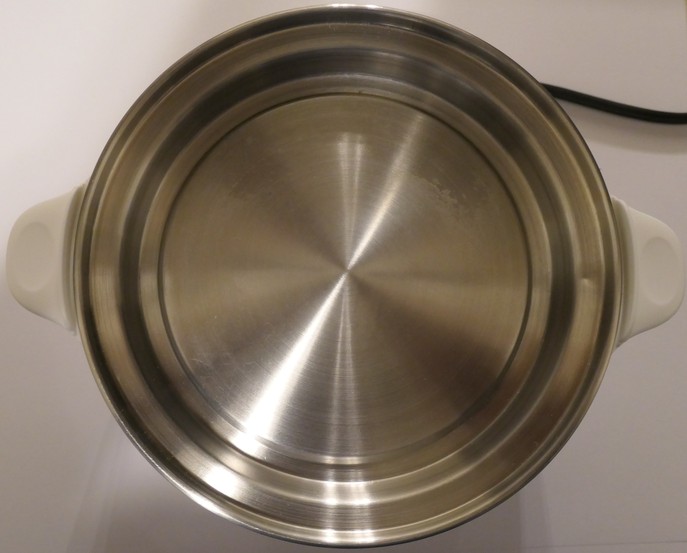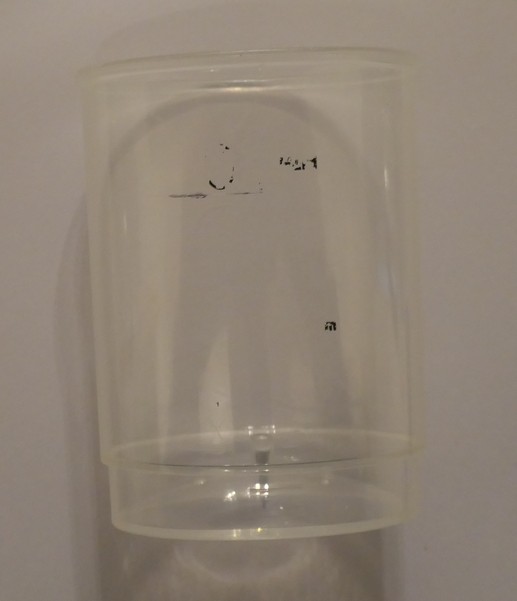Update 8/31/23: The egg cooker is still going strong, after 3.5 years of cooking one egg twice a week. A slight amount of oxidation from me throwing a small amount of undiluted vinegar on the still warm stainless steel remains. see pic 1, but it does not bother me. (If you throw on undiluted vinegar, make sure it is enough that it does not largely boils away.) The only minor problem I have had is that the lettering on the measuring cup largely disappeared, see pic 2. The measuring line that I use for cooking one soft egg is still visible just below the partially visible top egg shape, because I put a notch with a utility knife at that location and then darkened it with a fine point permanent marker.
This machine is well designed. It has rubber anti-slip feet and a stainless steel hot surface. If this accumulates mineral deposits, put a couple of table spoons of vinegar on the surface while it is still warm after cooking and let it sit 10 minutes or so until the deposits are dissolved. Caution: do not get liquids inside the base unit. I use water from my zero-water filter to cook eggs, which leaves very little deposits. Distilled water should be better. The cooker turns off automatically when the water is gone. The buzzer is not melodious but not overly loud or grating. But, really, you do not need a buzzer, as you must be with the cooker when it turns off, to take out the eggs immediately and flush them below cold water to make them easy to peel and cool them enough to stop cooking. Otherwise you have no control over how much cooking occurs. (You may want to quickly sponge off any remaining hot condensed steam from the plastic handles before lifting the egg holder out.) The click the machine makes when it finishes should be enough.
The only problem I see with the machine are the instructions, which are horrible. The first time I tried to make a soft boiled egg, I used the measuring cup and filled it somewhat above the mark for soft-boiled. Oops. The egg cooker turned off after about 2 minutes, and the egg was still all liquid inside. Uneatable. To boil a single egg, you must use far more water than the instructions say. In particular, you need to fill to almost the hard-boiled mark, about 200% more water than the instructions indicate. The reason is simple: if you have 7 eggs in the cooker, almost all the steam generated hits an egg somewhere, condenses, and falls back on the hot surface. But with only a single egg in the center of the rack, almost all steam *escapes* through the hole; this causes the cooker to run out of water far too early unless you put in far more water initially. Keep this in mind when you are cooking less than 7 eggs. In addition, until you have the exact amount of water figured out, *use a timer*. In the instructions there is a table of needed cooking times, and the times in this table are OK. For example, for a soft-boiled egg, you need to cook about 8 minutes. If the water you put in runs out somewhat before the appropriate time, just let the egg sitting in the cooker for a few more minutes and next time use more water. On the other hand, if you put in too much water, take the eggs out after the correct time (without burning yourself with hot steam), even though the cooker is still going.
The bottom line is of course that the company should not have every single buyer separately figure out how much water to use. *They* should do that. There should be a two-dimensional table in the instructions with the number of eggs being boiled horizontally and the desired doneness vertical, and in the body of the table the amount of water to use for that number of eggs and doneness. I suggest the table is made for the more or less standard "large eggs".
Update: I withdraw the recommendation to add just vinegar while the unit is still hot. My stainless steel developed oxidation that I had to get off with Rejuvenate. If you add vinegar immediately, add vinegar diluted with lots of water. What I do nowadays is add half a cup or so more of filtered water. This cools the machine down so that no water dries up on the surface and so no deposits form.

